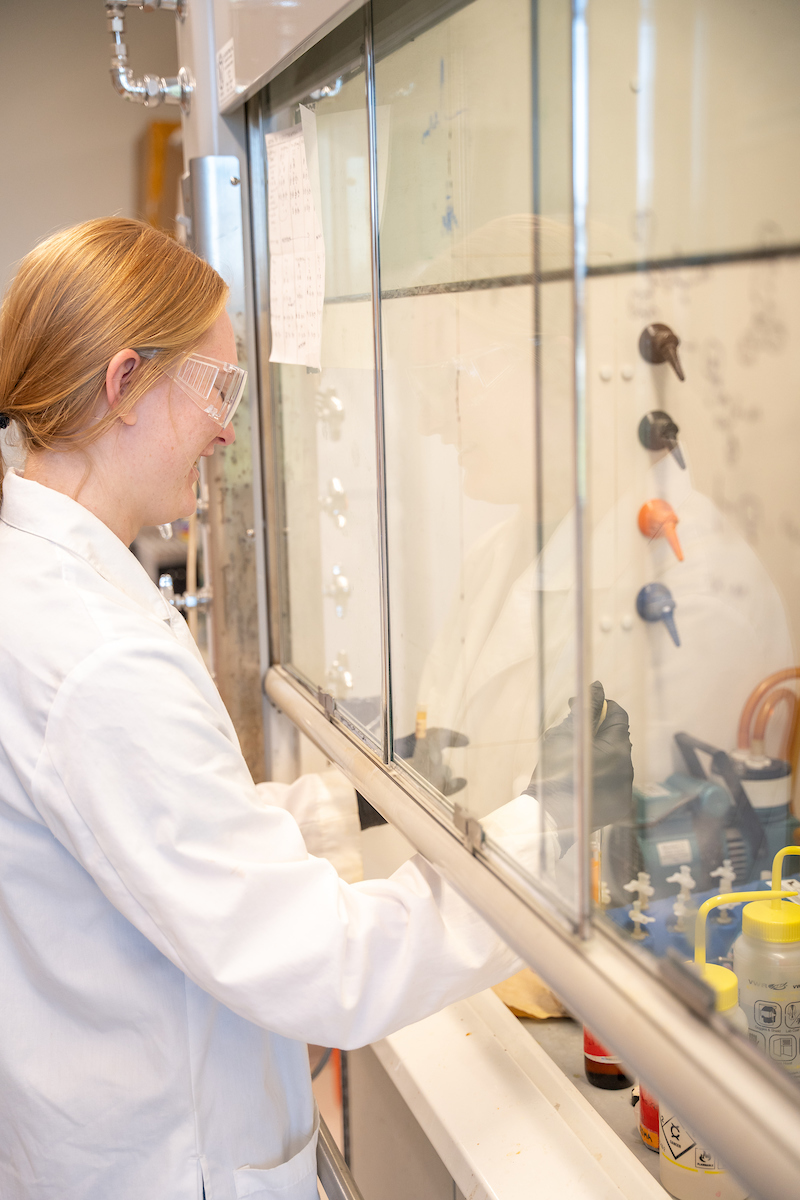Chemistry Programs
Engage. Explore. Experiment.

B.S. in Chemistry
Certified by the American Chemical Society, the Bachelor of Science in Chemistry provides you with a robust foundation in the principles of chemistry and a deep understanding of the molecular world.
In the program, you'll have opportunities to collaborate with experienced faculty, engage in cutting-edge experiments and prepare for careers in dynamic fields such as pharmaceuticals, materials science, environmental analysis and more:
- Preparation for Advanced Degrees & Industry Professions: The B.S. in Chemistry may be your best option if you plan on continuing your studies in graduate or professional schools. We'll also provide you the tools and skills to directly enter the chemical industry upon graduation.
- Depth of Coursework: The B.S. in Chemistry requires more extensive, required coursework in chemistry and physics. It provides a deeper focus on the theoretical and practical aspects of chemistry.
- Extensive Laboratory Experience: The B.S. program emphasizes hands-on laboratory work, providing you with extensive experience in research while using some of today's most sophisticated instruments and analytical tools including 400 MHz NMR, LC/MS, FT-IR, EPR and AFM.
- Specialization Exploration: In our B.S. program, you'll explore opportunities for specialization in the various branches of chemistry including organic, inorganic, biochemistry, physical and analytical chemistry.
View curriculum: Chemistry, B.S.
B.A. in Chemistry
The Bachelor of Arts in Chemistry is the best option for students who have an interest in chemistry, but would like more flexibility to tailor the degree to their specific interests.
- Broadened Curriculum: The B.A. program has fewer required chemistry courses, providing the flexibility for you to explore other courses that enhance and provide unique perspectives to your chemistry interests. Students completing the B.A. in Chemistry have added a second major in fields such as Communication, Psychology, and Marine Biology.
- Interdisciplinary Focus: The B.A. programs encourages interdisciplinary studies, allowing students to combine chemistry with other fields like business, law, or education.
- Preparation for Diverse Careers: The B.A. program may be an option for you if you are interested in careers that involve chemistry but may not require an extensive background in the natural sciences. The B.A. program could be for you if you are looking to a career in education, healthcare administration, law, or business.
- Schedule Flexibility: The B.A. programs provide more flexibility, allowing you to customize your education to match their interests and career goals. The B.A. degree also easily allows time for a semester studying abroad.
View curriculum: Chemistry, B.A.
B.A. Chemistry-Teacher Education Program (9-12)
If you have a goal of teaching science at the high school level, the Chemistry and Biochemistry Department offers a joint program with the School of Education - a Bachelor of Arts in Chemistry-Teacher Education Program (Grades 9-12).
- Certification for High School Teaching: The B.A. Chemistry-Teacher Education program prepares you for certification to teach chemistry at the high school level (Grades 9-12) and a direct pathway to a career in education.
- Clinical Practice Internship: The program provides a required student teaching component in a public school setting. You'll gain real-world experience in the classroom under the guidance of experienced educators.
- Comprehensive Curriculum: The program balances chemistry content with education courses to provide you with a deep understanding of chemistry along with effective teaching strategies.
View curriculum: Chemistry, Teacher Education Program (Grades 9-12), B.A.
Chemistry Minor
Whether you are majoring in a STEM field, preparing for medical school or pursuing a degree in the humanities or social sciences, a chemistry minor can enhance your College of Charleston experience and contribute to your development as a versatile and adaptable professional.
- Increased Marketability: A minor in chemistry can dramatically increase your chances for full-time or part-time employment after graduation, even if you are assured of admission to a graduate or professional school program.
- Complementary Skills: The analytical and problem-solving skills developed through a chemistry minor are valued in a wide-range of professions, adding a practical and scientific dimension to your skill set.
- Diverse Career Opportunities: Industries such as healthcare, environmental science, and technology value individuals with a background in chemistry.
- Closer than you might think: A chemistry minor is not out of reach for students majoring in another discipline. Students preparing for medical school generally take a year each of general chemistry and organic chemistry courses, plus at least one semester of biochemistry. By this time, you'll need only one additional course (Fundamentals of Analytical Chemistry, CHEM 220/220L) to fulfill the requirements for a minor in chemistry.
View curriculum: Chemistry Minor
The Chemistry of Fireworks
Careers & Outcomes
What can you do with a chemistry degree? Take a closer look at the career journeys of our alumni and browse the data below to discover where their College of Charleston degrees have taken them.
